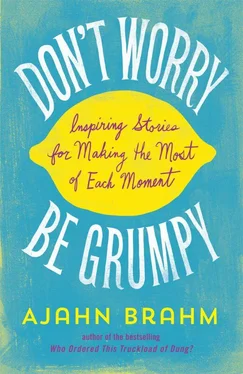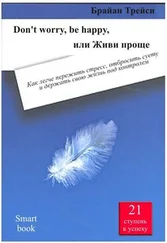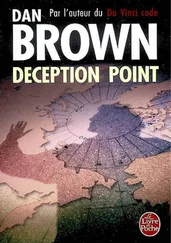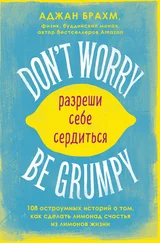That wasn’t what we expected, but it worked.
The noise would still reverberate in our eardrums but no longer in our minds. We made peace with the inconvenience. It was only three days and soon passed.
Many years later, one of the monk’s brothers visited our monastery in Australia. Unfortunately all the guest rooms were full, so the monk asked me if his brother could share his room, just for one night. After all, they had grown up together sharing a room.
“Ah, but you are both much older now,” I pointed out. “You probably both snore.” The monk insisted there would be no problem, so permission was granted.
The monk’s brother fell asleep first and, as predicted, snored so loud that the monk could not get to sleep. Exhausted and sleepless, the monk remembered the advice he had been given. “It is not the sound that disturbs you. It is you who disturb the sound!”
So he started to play with his perception of the snoring, overlaying the sound with imagining it was a soothing melody from a famous classical composer. He could not change the sound of snoring, but he could change the way he perceived it.
When he woke up the next morning, the last thing he remembered, before falling into a refreshing sleep, was how melodious had become his brother’s snoring!
So if you have a husband who snores, imagine you are listening to the Grateful Dead or whatever music you like. When the dog barks in the middle of the night, perceive it as an interpretation of Tchaikovsky’s 1812 Overture or something similar. When you can’t escape the noise, try changing your perception of it.
Much of life is spent having left somewhere but not yet arrived. These are the “in-between moments of your life.” They are too often wasted.
Before I was a monk, while I was teaching in a high school, a fellow teacher told me that he had applied for a much better job. He had secured the position but now had to wait a long six months for his teaching contract to expire before starting his dream job. He said that he was surprised and anguished to find himself wishing away a whole six months of his life.
“My life is too short to write off the next half year until I start the new job, but that is what I found myself doing!”
How much of your life has been wasted wishing away hours, days, and months waiting for something to happen: the aircraft to leave, the workday to finish, or the baby to be born? Unfortunately, most of our life is spent in such in-between moments.
Once it is recognized how so much of life is wasted, the tragic “murder rate” in society will decrease significantly. Not so many people will be killing time.
No more will we focus so intently on getting to the destination. Instead we will find new value in the journey, be able to relax in the traffic jam, be willing to speak to fellow commuters on the train, and discover the many adventures that only occur in those precious in-between moments of our lives.
Are You a Human Being or a Human Going?
It is very rare to find a human being today. They are always going somewhere, hardly ever being here. That is why I call them “human goings.” We have lost the art of just being.
One weekend in my Buddhist temple, I was busy with administration work when an old friend asked me how things were going.
“I’m getting there,” I answered.
“Where is it that you are getting to?” he continued wisely.
I immediately got the point and stopped rushing around.
“You have caught me out,” I answered, a little ashamed. “I guess the only place I am getting to, rushing around like this, is an early grave!” We both smiled.
If you are one of those “human goings,” ask yourself, “Where am I going to? And when will I arrive, if ever?”
As for me, I’ve already arrived. I’ve made it to here, and I can now call myself a human being. “Here” is a very comfortable place. I recommend that everyone visit and stay a while, instead of always running away from here, perpetually going somewhere else.
Now, when my friends ask me how things are going, I reply, “I’m just being here!”
Anxiety is looking at the future and considering all the things that could go wrong. Such unnecessary worry is a cognitive sickness of epidemic proportions in our modern world.
The antidote is looking at the future considering all the things that could go right. It actually increases the likelihood of success. It’s adding hope rather than negativity to your future. So don’t worry. Be hopey!
A long time ago, a wise but unorthodox spiritual leader taught that there were only two religions to be found in the world:
1. Those that bend the truth to fit their faith
2. Those that bend their faith to fit the truth
He was a follower of the second religion, always ready to abandon a dogma or ritual, no matter how cherished, if well-established facts did not support it.
He was never short of enemies among the traditionalists. Soon his foes found the means to destroy him.
He gave so many public talks, his foes accumulated statements he had made, portrayed them out of context, and accused him of heresy. At the trial, he was found guilty, and the penalty was death!
After the sentence of capital punishment was handed down, the spiritual leader sighed, “Oh, what a pity! I was planning to teach the wife of His Honor the judge a simple form of meditation so that she won’t argue with him ever again. Now I will not be able to teach her to be compliant. What a pity!”
“Do you know a method of meditation that can make my wife not argue with me?” asked the judge, intrigued.
“I know all types of meditation, Your Honor,” he replied.
“Hmm,” considered the judge. “All right. I will grant you a stay of execution for twelve months so that you may teach my wife not to argue with me. But if she is still argumentative after one year, I will personally attend your execution. Court is adjourned.”
As the spiritual leader left the courtroom, a free man for twelve months, his disciples asked him what this powerful method of meditation was that could make wives stop arguing with their husbands.
“I don’t know,” replied the spiritual leader. “I haven’t found such a method yet, but I might! Anyway, who knows what may happen in the next year? The judge’s wife might die, and that will stop her arguing with the judge — ha ha! Or else I myself might die of natural causes. Whatever, I now have twelve months of freedom. Remember the saying: Don’t worry, be hopey!”
Being a Visitor, Not an Owner
Visitors to my monastery would often tell me how tranquil and beautiful the monastery is. I would think they were crazy! Couldn’t they see how much work needed to be done? The buildings and grounds had to be maintained. The young monks had to be trained. And the endless questions of those visitors had to be answered. To me, the monastery was a busy work-camp. Something was wrong. I soon realized that it was my attitude.
So I changed my attitude.
One morning each week, usually on a Monday morning, I pretend to be a visitor, not an owner, in the monastery where I have lived for thirty years. As a visitor, I do not have to worry about maintaining the buildings and grounds. Teaching the monks is no longer my business. And, as a visitor, I don’t have to answer all those questions. On such mornings, I can appreciate this monastery just as a visitor can. I have found that the visitors are right. It is a beautiful and tranquil monastery, when you don’t own it.
I teach this same method to my friends. For a few hours every week, maybe on the weekend, pretend that you are a visitor in the house in which you live.
Читать дальше










